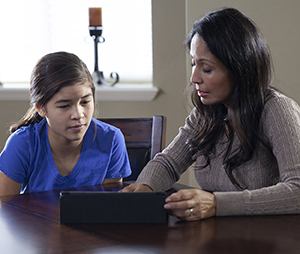Preparing Your 6- to 12-Year-Old for Surgery
Your school-age child is having surgery. You may have concerns about how your child will cope with this experience. Knowing what to expect can help you and your child feel better about surgery. Read this sheet to find out ways you can help prepare your child for surgery.

How will your school-age child react?
-
School-age children may worry about new experiences. For instance, they may worry that surgery will hurt. The hospital may seem like a large and frightening place to them. They may be overwhelmed from meeting so many new people at once. Also, the unfamiliar equipment may seem scary.
-
Older school-age children may worry about missing school and being away from friends.
How can you help your school-age child get ready for surgery?
School-age children can understand simple explanations about surgery. Talk with your child about surgery a week in advance. Be aware that your child may have questions that they are afraid to ask. Do the following to help your school-age child get ready for surgery:
-
Try to stay calm and relaxed. Your child can sense how you’re feeling. If you’re upset or fearful, your child may respond in a similar manner.
-
Choose your words carefully when explaining surgery to your child. As a general guide, start by explaining only what your child will directly experience. Be honest but gentle with your child.
-
Let your child understand the reason for surgery. School-age children may ask more complex questions about surgery. Be honest. If you don’t know the answer, reassure your child that you will try to find out.
-
Take a tour of the surgery department with your child if the hospital has this option. This can help both of you become more comfortable with the hospital setting. Encourage your child to speak with hospital staff and ask questions.
-
Use items, such as books or pictures, to teach your child about surgery.
-
Let your child make choices. Giving your child choices helps your child feel in control. Have your child pick toys and activities to bring to the hospital. These can include books, dolls, and video games. Also, let your child help pack their own suitcase to bring to the hospital.
-
Bring your child’s favorite item, such as a stuffed animal or blanket, with you to the hospital. This familiar object can help your child feel safe.
-
When your child needs soothing, do what normally works. This may include the following:
-
Ask hospital staff if your child’s siblings or friends can visit.
-
Keep routines as normal as possible in the hospital. This is especially important if your child is admitted into the hospital for a long time. Encourage your child to keep up with schoolwork and to keep in touch with family and friends.
Child life specialist
Many hospitals have a child life specialist. This person is specially trained to help children understand and cope with their hospital experience. Families can arrange to see a child life specialist when their child is scheduled for surgery. The child life specialist uses age-appropriate items such as books, dolls, and toy medical or hospital equipment to explain surgery. Parents and siblings are encouraged to attend and be a part of these sessions.
Online Medical Reviewer:
Dan Brennan MD
Online Medical Reviewer:
Jessica Gotwals RN BSN MPH
Online Medical Reviewer:
Liora C Adler MD
Date Last Reviewed:
12/1/2022
© 2000-2025 The StayWell Company, LLC. All rights reserved. This information is not intended as a substitute for professional medical care. Always follow your healthcare professional's instructions.